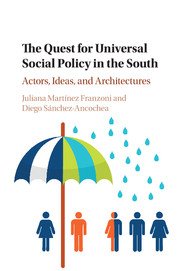Book contents
- Frontmatter
- Contents
- List of Figures
- List of Tables
- Acknowledgements
- List of Abbreviations
- Part I Universalism in the South
- 1 Introduction
- 2 Universalism in the South: Definition and Relevance
- Part II A Comparative Study of Policy Architectures
- Part III Building Universalism in Costa Rica
- Part IV Conclusions
- References
- Index
2 - Universalism in the South: Definition and Relevance
from Part I - Universalism in the South
Published online by Cambridge University Press: 10 November 2016
- Frontmatter
- Contents
- List of Figures
- List of Tables
- Acknowledgements
- List of Abbreviations
- Part I Universalism in the South
- 1 Introduction
- 2 Universalism in the South: Definition and Relevance
- Part II A Comparative Study of Policy Architectures
- Part III Building Universalism in Costa Rica
- Part IV Conclusions
- References
- Index
Summary
Introduction
In November 2013 at a dinner organized by the University of California-San Diego, the former Mexican President, Felipe Calderón, proudly claimed that “now there are doctors, treatments and medicines for every Mexican that needs them.” Qualified observers supported his claim (e.g. Frenk, 2006; WHO, 2010). Calderón was boasting about Seguro Popular, a non-contributory health insurance program that since 2003 reached – as a matter of right – families previously excluded from basic medical access. Seguro Popular, which by 2015 covered over 50 million Mexicans, embodies a U-turn from the means-tested programs that prevailed across Latin America during the 1980s and 1990s.
Improvements in access to health care are undoubtedly good news. However, given that benefits granted by contributory and non-contributory insurance are unequal, is it accurate to argue that Mexico has established universal health care services? How can countries truly provide everyone with similar, high quality, generous services and transfers?
In this chapter we first discuss how the literature has defined universalism, the problems these definitions pose in the context of the South, and how to move research on the matter forward (Section 2.2). We then explain why universalism is a desirable policy output, discussing its positive impact on poverty reduction and income redistribution, and also in avoiding stigma, nurturing social cohesion, and promoting state-building. Contravening neoclassical economics, generous redistributive social programs in areas like health and education have encouraged rather than harmed economic upgrading in the North (e.g. Sweden, Finland) and the South (e.g. Costa Rica, Mauritius). All throughout, our arguments in favor of universalism draw from the historical experience of a sub-set of countries in Europe and North America but also consider implications for the South. In the last section, we focus on one of the most significant challenges for the promotion of universalism: the fragmentation of social policy driven by a combination of policy design and market expansion.
What is Universalism? Minimalist and Maximalist Approaches
As a contested concept, universalism takes on a broad range of meanings. On the minimalist end, much of the recent literature – and many policymakers like President Calderón – define universal social policies in terms of coverage, regardless of how generous or equitable such coverage is. Referring to health care, Stuckler et al.
- Type
- Chapter
- Information
- The Quest for Universal Social Policy in the SouthActors, Ideas and Architectures, pp. 27 - 46Publisher: Cambridge University PressPrint publication year: 2016

